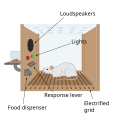Operant conditioning, also called instrumental conditioning, is a learning process in which voluntary behaviors are modified by association with the addition...
69 KB (9,071 words) - 05:23, 2 May 2025
chamber can be used to study both operant conditioning and classical conditioning. Skinner created the operant conditioning chamber as a variation of the...
16 KB (1,803 words) - 00:30, 2 May 2025
Reinforcement (redirect from Operant reinforcer)
behavior that decreases the likelihood that a response will occur. In operant conditioning terms, punishment does not need to involve any type of pain, fear...
77 KB (10,078 words) - 00:39, 2 May 2025
salivated when fed red meat. Pavlovian conditioning is distinct from operant conditioning (instrumental conditioning), through which the strength of a voluntary...
66 KB (8,779 words) - 22:17, 23 April 2025
B. F. Skinner (section Operant conditioning chamber)
operant conditioning to strengthen behavior, considering the rate of response to be the most effective measure of response strength. To study operant...
79 KB (9,727 words) - 23:38, 22 May 2025
Behaviorism (section Operant conditioning)
the S-delta. Although operant conditioning plays the largest role in discussions of behavioral mechanisms, respondent conditioning (also called Pavlovian...
90 KB (10,531 words) - 11:49, 22 May 2025
can be seen in operant conditioning. Where, depending on reinforcement and punishment of a particular behavior, a response is conditioned. In accordance...
14 KB (1,887 words) - 08:49, 30 January 2025
Extinction (psychology) (redirect from Operant extinction)
observed in both operantly conditioned and classically conditioned behavior, which manifests itself by fading of non-reinforced conditioned response over...
36 KB (4,423 words) - 22:41, 22 May 2025
Dog training (section Operant conditioning)
its behavior is modified through habituation or sensitisation; and operant conditioning, where it forms an association between an antecedent and its consequence...
92 KB (10,604 words) - 14:46, 24 May 2025
Social norm (section Operant conditioning)
Skinner, who states that operant conditioning plays a role in the process of social norm development. Operant conditioning is the process by which behaviours...
69 KB (8,422 words) - 11:26, 22 May 2025
Instinctive drift (section Operant conditioning)
failure of conditioning theory." B.F. Skinner was an American psychologist and father of operant conditioning (or instrumental conditioning), which is...
12 KB (1,482 words) - 20:56, 22 July 2024
Aplysia (section Operant conditioning)
can be transferred by RNA. Operant conditioning is considered a form of associative learning. Because operant conditioning involves intricate interaction...
28 KB (2,944 words) - 14:20, 14 May 2025
of operant conditioning, both in the laboratory and in behavior therapy. In classical or respondent conditioning, a neutral stimulus (conditioned stimulus)...
11 KB (1,410 words) - 10:52, 24 May 2025
behavior modification system based on the principles of respondent and operant conditioning. ABA is the applied form of behavior analysis; the other two are:...
92 KB (10,545 words) - 04:53, 19 May 2025
Self-control (section Operant conditioning)
control. Alcohol impairs self-control. Operant conditioning, sometimes referred to as Skinnerian conditioning, is the process of strengthening a behavior...
68 KB (8,563 words) - 18:53, 22 May 2025
Association (psychology) (section Operant conditioning)
is the basis for learning. This learning is seen in classical and operant conditioning.[citation needed] Edward Thorndike did research in this area and...
18 KB (2,446 words) - 14:38, 23 May 2025
known as the ABC contingency) is a psychological model describing operant conditioning in three terms consisting of a behavior, its consequence, and the...
3 KB (344 words) - 04:06, 14 May 2024
Pain in invertebrates (section Operant conditioning)
each period, demonstrating operant conditioning. A fly-controlled heat-box has been designed to study operant conditioning in several studies of Drosophila...
88 KB (9,967 words) - 21:05, 23 May 2025
Clicker training (redirect from Clicker conditioning)
method based on a bridging stimulus (the clicker) in operant conditioning. The system uses conditioned reinforcers, which a trainer can deliver more quickly...
16 KB (1,922 words) - 12:01, 4 February 2025
In behavioral psychology, stimulus control is a phenomenon in operant conditioning that occurs when an organism behaves in one way in the presence of a...
11 KB (1,425 words) - 07:44, 20 February 2025
Radical behaviorism (section Operant psychology)
these and similar behaviors, called "operants", come about. Roughly speaking, in operant conditioning, an operant is actively emitted and produces changes...
14 KB (1,656 words) - 17:23, 24 May 2025
Learning (section Operant conditioning)
learning may occur as a result of habituation, or classical conditioning, operant conditioning or as a result of more complex activities such as play, seen...
79 KB (9,970 words) - 14:03, 23 May 2025
techniques based on behaviorism's theory of learning: respondent or operant conditioning. Behaviourists who practice these techniques are either behaviour...
59 KB (7,441 words) - 06:28, 19 March 2025
Bedwetting alarm (section Operant conditioning)
This suggests that the conditioning treatment may follow the operant avoidance conditioning rather than the classical conditioning pattern. In addition...
12 KB (1,718 words) - 00:07, 14 July 2024
eventually replaced by the terms "reinforcing" and "punishing," when operant conditioning became known. "Satisfying" and "dissatisfying" conditions are determined...
10 KB (1,503 words) - 23:16, 20 April 2025
most important of these are classical conditioning and operant conditioning. In classical (or respondent) conditioning, behavior is understood as responses...
108 KB (14,244 words) - 18:48, 1 June 2024
stimulus Covert conditioning, classical and operant conditioning in mental health treatment Operant conditioning or instrumental conditioning, a form of learning...
2 KB (320 words) - 02:48, 16 March 2025
Jerzy Konorski (section Secondary conditioned reflexes)
developed the work of Ivan Pavlov by discovering secondary conditioned reflexes and operant conditioning. He also proposed the idea of gnostic neurons, a concept...
8 KB (917 words) - 21:08, 24 April 2025
either due to misplaced faith in operant conditioning or due to human error in implementing operant conditioning, exposes its trainers to the risks...
39 KB (3,586 words) - 02:55, 24 May 2025
potentials in the brain to reinforce desired brain states through operant conditioning. This process is non-invasive neurotherapy and typically collects...
32 KB (3,387 words) - 15:44, 22 May 2025











